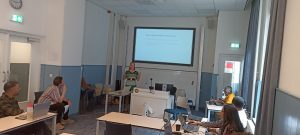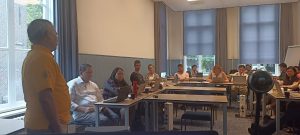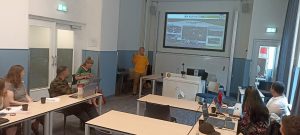


Utrecht, Netherlands – July 10, 2024
The Forest City Research Consortium, a collaborative research team between Utrecht University and Universitas Gadjah Mada, held a thematic session at the LANDac Summer School on Wednesday, July 10, 2024, at Utrecht University. The session, titled “Fair Urban Transitions and the Role of Land: The Case of Indonesia’s New Capital City Planning,” attracted participants from various countries interested in Indonesia’s new capital city development and research on just urban transitions.
The session commenced at 10:00 CEST with a theoretical lecture on the diversity of contemporary urban theory, delivered by Femke van Noorloos, a work package manager from the Dutch side of the Forest City collaboration team. The lecture concluded with a thought-provoking question on how to apply these theories and concepts to understand the current issues of urban land in the context of fair transitions.
Following the lecture, Rijanta and Erlis Saputra, work package managers from the Indonesian side and lecturers from the Department of Development Geography, Faculty of Geography, Universitas Gadjah Mada, presented their research outcomes. Their presentation, titled “Indonesia’s New Capital City IKN: Rationales, Planning, and Socioeconomic Impact,” provided valuable insights into the planning and socioeconomic implications of the new capital city.
The session continued with a presentation on “Indonesia’s New Capital City IKN: Implications for Energy, Food Security, and ‘Beyond-Human’ Ecological Impact,” by Ari Susanti, Agung Jauhari, and Rizki Adriadi Ghiffari. Ari Susanti, a work package manager from the Indonesian side and a lecturer at the Faculty of Forestry, Universitas Gadjah Mada, was joined by Agung Jauhari and Rizki Adriadi Ghiffari, PhD candidates at International Development Studies, Faculty of Geosciences, Utrecht University. Rizki is also a lecturer at the Department of Development Geography, Faculty of Geography, Universitas Gadjah Mada, while Agung is a lecturer at the Vocational College of Universitas Gadjah Mada.
After the presentations, the session transitioned into a discussion and formulation of dilemma urban transition issues in the context of Indonesia’s new capital city development. This engaging discussion lasted for an hour until 13:00 CEST.
Following a lunch break, the session resumed with a discussion with researchers, moderated by Femke van Noorloos and Bosman Batubara. The session concluded at 15:00 CEST, leaving participants with a deeper understanding of the complexities and challenges associated with fair urban transitions and the role of land in the development of Indonesia’s new capital city.
